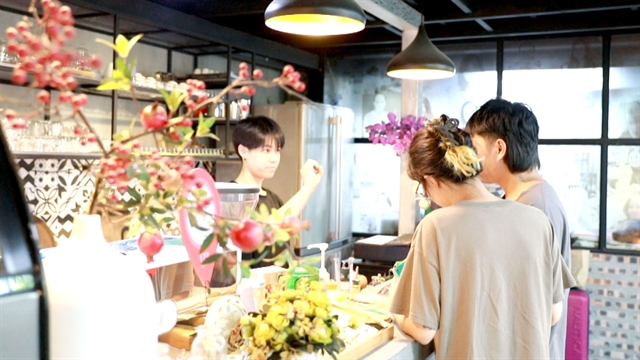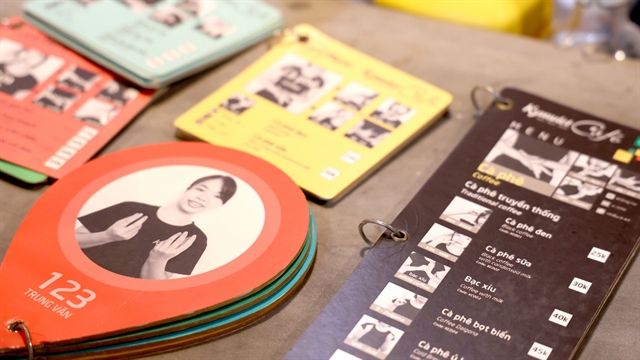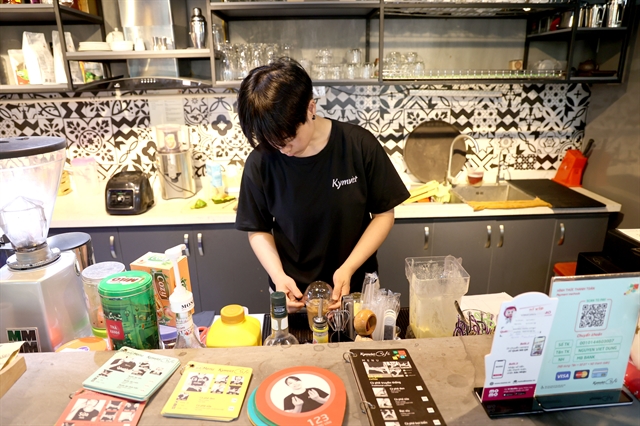 Features
Features

By Minh Phương & Vân Nguyễn
 |
At Kymviet cafe, staff and customers use sign language to communicate. VNS Photo Minh Phương
There is one cafe chain in Việt Nam that stands out in particular. Kymviet cafe provides a new and heart-warming experience as diners, served by a team of hearing-impaired people, can order using sign language.
Without using words, a waitress bows her head to welcome customers to the cafe. She then offers them menus so they can place an order.
The menus are specially designed with sign language. Each drink has detailed sign instructions so customers can know how to use sign language to express their orders.
“We have created a lot of tools [such as menus] for employees with hearing-impairment to help them communicate with customers easier. Customers at our coffee shop can also try to order drinks using sign language," Phạm Việt Hoài, CEO of the Kymviet complex, said.
“This is a new experience for them and, luckily, I’m very pleased that we have received a lot of positive feedback from customers.”
 |
The menus are specially designed to show sign language. VNS Photo Minh Phương
The cafe is one of the services provided at the Kymviet complex. The complex was established in 2013 to create job opportunities for the hearing-impaired community. It started with handicrafts made mainly from fabric, and now it is home to over 30 employees with hearing impairment.
To create more job options for the staff, the complex broadened its business to food and beverage services.
“Though we face challenges such as finding bartender instructors or translators who can use sign language, the staff here adapt to the job very quickly, so there are no major difficulties,” Hoài said.
Trần Ngọc Mai has worked in Kymviet for two and a half years. She made handicraft souvenirs when she started working at Kymviet but switched to becoming a barmaid.
She has been trained to prepare drinks, greet customers and deal with some unexpected situations or accidents at the cafe.
“Customers must use sign language to order coffee or other drinks from us as we are hearing and speech-impaired. We like it and want to thank them very much. I’ve been working here for two and a half years now. I'm thrilled to work here,” Mai said.
The chain now has three shops in Hà Nội, and it provides jobs for eight hearing-impaired people. One cafe is on Trung Văn Street, while the two others are on Nguyễn Đình Thi and Võ Chí Công streets.
The staff take turns working at the three shops.
 |
Employees are trained to prepare drinks and greet customers. VNS Photo Vân Nguyễn
Phạm Vũ Hà Anh, a student from FPT University, travels a long distance from home to the cafe. For her, though the cafe is served by the disabled, customers do not feel a sense of commiseration or charity. The cafe creates a valued atmosphere for people.
“I felt a bit awkward at first. But with the help of the staff, I found there are no difficulties for me when ordering," Anh said.
“People here are very friendly. Because all the staff here are disabled, it is a unique experience that I cannot find anywhere else.”
Võ Nhật Quang, a third-year student of FPT University, is impressed with the large space at the cafe.
“I see the space here is quite large. I find it very interesting when using sign language to order, and the waitress is very friendly. When I ask about sign language, she guides me very carefully,” he said.
There are more than 2 million hearing-impaired people in Việt Nam. This is a potential workforce whose only barrier is communication. However, the barrier can be easily removed if the supporting means exist.
"In the future, we want to have more coffee shops in Hà Nội, and maybe not only in Hà Nội but also in other big cities such as Đà Nẵng, Nha Trang or HCM City,” Hoài said.
“So hearing-impaired people in other provinces can also have the opportunity to get a job, have a better life and reduce the burden on their families and society.” — VNS




